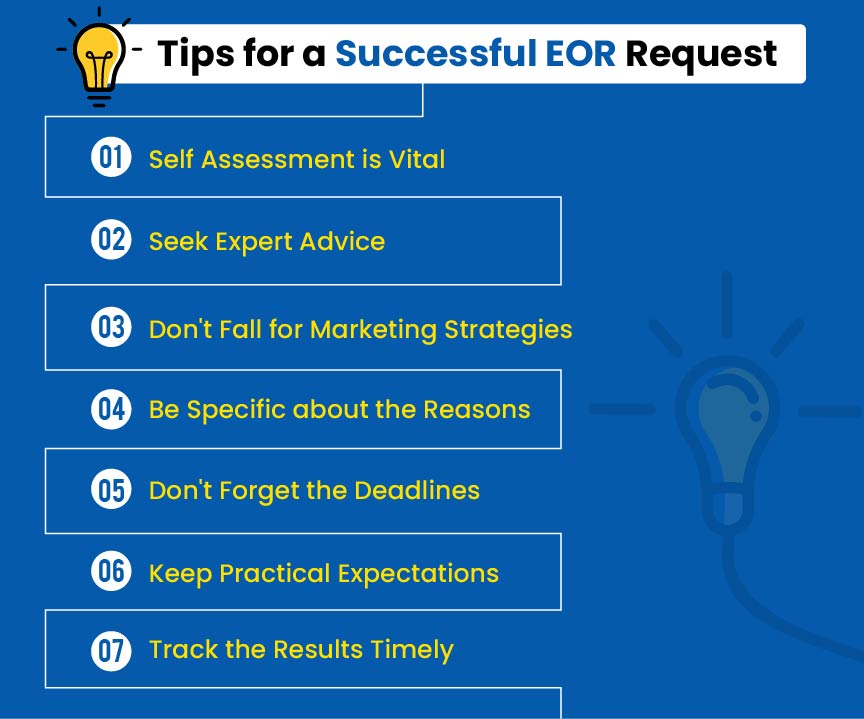Some IELTS test takers may not be satisfied with their exam results. They can appeal to their respective test centers to re-assess their tests. This process is called Enquiry on Results (EOR) in IELTS. If you are not satisfied with your marks in the IELTS exam, you can always consider this option. You can find EOR IELTS fees in the sections below. This blog will also discuss how you can get help from one of the best IELTS coaching online for study material, writing, listening, speaking, and IELTS reading practice tests and more resources.

Table of Contents
If you are not satisfied with your IELTS results, you can request your test to be re-assessed and re-marked. This is called an EOR or Enquiry on Results. You can contact your test center to schedule the re-marking of your IELTS test results. You can choose the sections you wish to be rechecked. Indeed, the IELTS exam is one of the most accepted and trusted English skill tests. However, there can be human errors and other reasons due to which some discrepancies can be caused. However, remember that the EOR IELTS success rate is only 50%.
The IELTS exam consists of 4 sections which are reading, writing, listening, and speaking. The IELTS test is accepted by more than 11,000 organizations all around the world. This makes it super reliable! However, after taking the test, if you receive the TRF (Test Report Form), and you are not happy with the scores, you can take this step. The sections below will discuss other vital details on EOR in IELTS.
Also Read: Best IELTS Speaking Tips
The EOR IELTS fees vary from 90 USD to 150 USD, which is 7,402 INR to 12,337 INR. There are several types of IELTS exams. Thus, the IELTS EOR fees vary for exams of different types as per the table below:
| TYPES OF IELTS EXAM | FEES IN INR |
|---|---|
| IELTS | 12,200 INR |
| CD IELTS | 12,200 INR |
| UKVI IELTS | 12,375 INR |
| IELTS Life Skills | 11,525 INR |
The next subheading will talk about the time it takes for the entire processing of EOR in IELTS:
After you apply for an EOR, you will get the outcome of the same within 21 days of your request. EOR IELTS meaning is enquiry on results. Moreover, this time period can be as short as an hour and as long as 21 days depending on various factors like how many sections you want to be rechecked.
This is what EOR in IELTS is for. Now, let us know more about the benefits it can bring you as a test taker. The next section can help you with the same.
There are several benefits of Enquiry on the results of the IELTS exam. It can assure you and the authorities. Moreover, it can also be a reason for a positive change in your IELTS scores. Take a look at more of the benefits of the IELTS EOR:
1) Ensuring Fair Scoring: It allows candidates to request a re-marking of their IELTS test papers. This is valid if they believe their performance has been wrongly assessed. It can happen by mistake as well as the evaluators and examiners are also humans and not AI. Thus, human error is very much possible. By applying for an EOR, test takers can expect an entire re-evaluation of their answers. This is also done by experienced examiners to ensure a fair checking. Moreover, it is an accurate representation of test takers' language skills.
2) Gaining Validating Abilities: Obtaining a desirable score on the IELTS test is often a key requirement. This is the case for many purposes, such as admission to universities or professional registration. Besides, it can also be immigration applications. In addition to this, they will achieve their desired outcome after challenging their initial scores. Besides, you can send IETLS score to university if you get the desired score.
Also Read: IELTS or Duolingo? Which one is best?
3) Addressing Potential Human Errors: Human judgment is, indeed, not infallible. Thus, it is better to send the scores for a review if you doubt your performance and the scores don't match. As noted before, there may be instances where errors or anomalies occur during the marking process of the IELTS exam. By requesting an EOR, individuals can ensure that their test papers go through IELTS revaluation. This will allow for the identification and rectification of any potential mistakes. These errors may or may not have influenced the initial scoring of your IELTS exam.
4) Maximizing Opportunities: There are people who need a specific score to enter a country for work and/or study purposes. The EOR in IELTS is for individuals with specific score requirements for academic or professional pursuits. The EOR process can be instrumental in opening doors to new opportunities for them. A slight increase in scores can sometimes greatly affect meeting eligibility criteria. This can be for scholarships, university admissions, or employment prospects.
These are the many benefits of the EOR policy by IELTS. Now, let us jump on to the next section. This part of the blog will talk about the process of sending an EOR (IELTS enquiry on result).
Also Read: Best IELTS Reading Tips
Here is how you can send the request to authorities for EOR in IELTS exam:
Note: Follow the guidelines provided by the given on the test taker portal.
Also Read: CEFR Levels to IELTS Score Comparison
These are the steps you must follow in order to send an EOR in IELTS exam. However, make sure that you do so only after confirming that you are not satisfied with the results. Now, the next section of the blog will talk about the key elements that you need to keep in mind before sending the request.
It is true that, due to being prone to human errors, IELTS scores can be dissatisfactory. However, there are several things you need to confirm from your side before you send the request. Therefore, this section will tell you the things that you need to be mindful of.
Thus, before you send the request, consider the following pointers and facts:
These are the various key pointers you can not afford to neglect taking them in need. Another thing that you can not neglect is good preparation for the IELTS speaking practice test!
Moreover, there is more to the EOR in IELTS, thus, the next section will talk about the tips that you can keep in mind while sending a request for EOR.
Also read: Effective Tips to Prepare for IELTS Exam
These tips will help you self-introspect just one more time before spending effort and money on an EOR IELTS exam. It is vital to know that there can be mistakes on your side as well. The list of these helpful and thoughtful tips is below:
The above pointers are explained in detail below:
Firstly, the test taker should consider re-assessing the situation as a whole. They should start with specific sections that they want to be re-marked or reviewed. Moreover, they must also take a look at the scoring criteria for the same. In addition to this, it is important to remember your answers and potential while writing them.
Secondly, take help from experts and advice from people who are well-versed in this area. Moreover, their experience can help you understand whether you should request an EOR or not. In addition to this, they can also help you predict if you can expect a positive change in the results or not.
Thirdly, it would be wise to sincerely consider the scoring system of the IELTS exam before making a decision. Moreover, revise what you said and wrote in the test before requesting an EOR. There is a chance of human errors but they can be from your side too!
Also, Read IELTS Reading Passages for Practice!
Furthermore, after completing the EOR form, make sure you have mentioned all the sections you doubt about. Also, all those that you want to be reviewed or remarked on.
Moreover, you must also keep checking the deadlines for submitting an EOR. Procrastinating or thinking too much can take this opportunity away. If you are certain that there has been a mistake from their side and want your scores to be reviewed and re-marked. Go ahead before 6 weeks after the result release date ends.
Second and lastly, it is important to keep the expectations low and ethical. Make sure that you are aware that the results can be negative or neutral as well. In any case, the re-evaluation is itself proof that you trust their authority. Moreover, their decision is what matters. Thus, prepare well with your IELTS listening practice test and leave no scope for doubt! However, you can send an appeal if you are not satisfied with the EOR either.
Stay in touch with the relevant authorities or your test center to inquire about the status of your request.
To sum up, the EOR in IELTS is one of the best ways to assure a person of their IELTS results. Moreover, it also helps in building confidence in oneself. In addition to this, it has an easy procedure and also ensures a refund if there is any change in the scores. However, it is important that you make sure that your preparation for your IELTS exam is up to the mark and that the entire IELTS syllabus is on your tips.
You can always opt for IELTS coaching that can help you prepare well. The best option would be Gradding! Here’s why:
If the results come in your favor and there is an increase in the band score, you will get a full refund.
After receiving your request for an IELTS enquiry on result, a senior examiner will re-examine all the mentioned sections by you without knowing your previous scores. If there are any changes, they will issue a new TRF (Test Report Form) to you.
Follow the following steps to check the results of the EOR in IELTS:
The IELTS rechecking result time can be anywhere from 2 to 21 days.
Within the first six weeks from the date when you received your first TRF, you can apply for the EOR. Moreover, you can either choose all the sections of the IELTS exam pattern to be reviewed or select the ones you are sure about.
The entire processing of the EOR takes no more than 21 days. This includes the release of the new results. Moreover, after receiving the new results, if they are different from the previous one, you have to give your old TRF back to get a new one.

We are available in :
BangaloreAhmedabadJaipurHyderabadKeralaPuneChandigarhMumbaiGurgaonChennaiKolkataTrivandrumNoidaKochiCalicutKottayamKollamThrissurIndoreUdaipurdisclaimer:logos and other registered trademarks of universities used on this platform are held by their respective owners. Gradding does not claim ownership or association on them, and their use is purely for informational and illustrative purposes.


 Take Reading Mock Test Now!
Take Reading Mock Test Now! 

